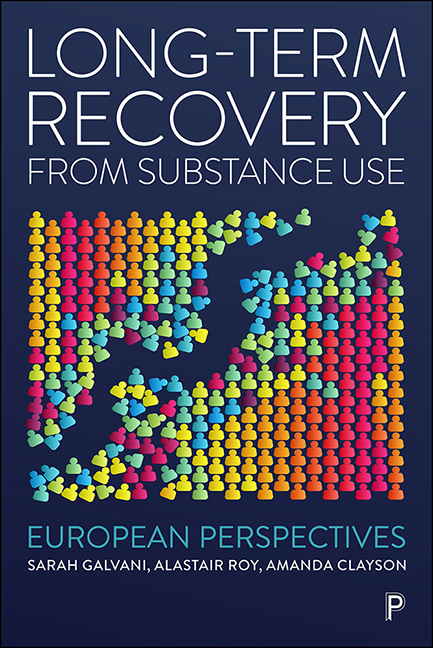5 - Provider and user perspectives on long-term recovery in England: how do we know when we are done?
Published online by Cambridge University Press: 15 September 2022
Summary
Introduction
This chapter is reflective in nature and aims to demonstrate the dynamic, non-linear and complex trajectories involved in the journey towards long-term recovery from substance misuse. The authors first discuss some of the challenges in identifying and analysing long-term recovery. They then present two real-life examples of people with lived experience of long-term recovery and offer clinical reflections on these. The chapter ends with a discussion of these case examples and their limitations, offering recommendations for future research and a way forward that is more sensitive to the needs of people in long-term recovery.
Context
Substance misuse continues to pose a risk to public health and the safety of people living in the United Kingdom (UK). The 2019 European Drug Report indicated that treatment entrants for opiate and crack cocaine clients in the UK have recently increased (EMCDDA, 2019). In 2019, the UK had the highest overdose mortality rate in Europe (National Records of Scotland, 2019). Although this information does not provide a complete picture of the drug situation, it could indicate that drug treatment providers are struggling to keep up with the British government's target of ‘increas[ing] the rate of individuals recovering from their dependence’ (H.M. Government 2017, p 6). This shows that there remains a need for the scientific community to focus on recovery from substance misuse and its various trajectories and manifestations.
Traditionally, recovery has been analysed and understood by addiction science as either the non-use of substances or the absence of symptoms relating to addictive behaviours; in other words, as a quantifiable treatment outcome (Ashford et al, 2018). However, Brown and Ashford (2019, p 2) argue that ‘the absence of pathology reveals little information about the initialisation and sustainment of recovery’. In other words, the traditional way of studying recovery from substance misuse predominantly involves studying causes and effects of the substance-use disease (that is, pathology), which has reduced our understanding of recovery as being the absence of substance-misuse symptoms (Brown and Ashford, 2019). When, for example, an individual with co-occurring substance misuse and mental health issues stops using substances, they may still suffer from mental health issues which might make it hard to consider them as recovered.
- Type
- Chapter
- Information
- Long-Term Recovery from Substance UseEuropean Perspectives, pp. 53 - 64Publisher: Bristol University PressPrint publication year: 2022



